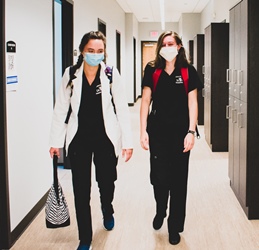Simulation Center to Transform Health Sciences Education, Professional Development
Sep 9, 2020
Simulation Center to Transform Health Sciences Education, Professional Development
Sep 9, 2020AMHERST, N.Y. – Daemen College has opened a new state-of-the-art Center for Interprofessional Learning and Simulation (CILS) designed to educate students using real-life clinical experiences and to serve as a regional resource for professional development in the community.
“We are proud to unveil this first-class center that will transform the educational experience for our students and provide them a facility in which they will receive real-life training that will best prepare them to serve our Buffalo Niagara region and beyond,” said Daemen President Gary Olson. “This project clearly shows that Daemen is moving forward despite the challenges of the COVID-19 pandemic, and we are excited about the center serving as a much sought-after resource and community partner for learning opportunities for practitioners in a range of fields.”
Located in Daemen’s Research and Information Commons, CILS houses eight modern examination rooms, a counseling room, and a space for telehealth, telecounseling, and face-to-face interprofessional learning experiences. At the center, students will be immersed in simulated patient scenarios that mimic real life. Standardized patients, actors who are trained to portray patients with particular symptoms and circumstances, will help bring the clinical cases to life, while the conference room will allow students from different professional programs to work together to interpret patient and client interactions in an interdisciplinary manner.
“CILS will bring students together to learn the way they will work in their profession – as members of a team and give them practical experience that will enable them to develop a better understanding of the interconnectedness with colleagues in their profession and other disciplines,” said Dr. Michael Brogan, senior vice president for academic affairs and dean of the college. “By engaging in a variety of realistic scenarios, students will improve their diagnostic, analytical, communications, decision-making, and other core skills all in a safe teaching and learning environment.”
Each space in CILS will be equipped with a video camera that will allow for practical experiences to be recorded and incorporate the use of wireless headphones that will enable students to receive instructions during their experiences. After a simulation, a student will then review their scenario with their faculty member and receive feedback on how they interacted with the patient, reflect on their actions, discuss what went right and wrong, and review areas for improvement, all with the intention of helping them be a more competent, confident, and compassionate professional.
The 2,400 square-foot center, which has established health and safety protocols and universal precautions for all who will use it, is a replica of a professional health clinic. To start, physician assistant studies students will use CILS this fall and then in the spring will broaden to Daemen students in other health and human services programs, including nursing, physical therapy, applied behavior analysis, athletic training, social work, education, and paralegal studies, to learn as members of a team. The scope of Daemen majors using the center is expected to expand as the college develops additional learning opportunities at CILS for other disciplines.
CILS will be overseen by Dr. Gregg Shutts, interim executive director and former program director of physician assistant studies, and Dr. Mary Iwanenko, interim coordinator. Dr. Diane Bessel, department chair of social work and sociology, led the development of the center’s strategic plan, mission, vision, and values, and will be key in creating professional development opportunities offered at CILS.
“Real-life simulations bring to light the humanistic touches and soft skills, such as effective listening and making eye contact, that are vital to the competency of today’s practitioners,” said Shutts. “This simulation center will allow students to further explore their role as future health care professionals in an interprofessional setting that will help them build on their teamwork abilities.”
According to a Hanover Research report on “Benchmarking Health Sciences Simulation and Training Facilities,” health care practitioners consider simulation centers beneficial to students and patients. Researchers and practitioners in health sciences-related fields highlight that simulations can demonstrably enhance students’ skills and competencies, as well as improve patients’ safety and well-being.
It is expected that in a typical academic year, at least 450 Daemen students will use CILS in their major. Beyond this, the center’s learning modules will provide opportunities for professionals to advance their skills and earn certifications in their field. Future plans call for the formation of a Community Advisory Board made up of local professionals from various fields.
“By learning in a realistic setting, students will be placed in a situation where they will have to think on their feet and will safely practice and develop their skills,” said Elizabeth Wright, dean of health and human services. “We will recruit diverse actors to play patients in the real-life scenarios so that students are exposed to diversity in our population while also promoting human and patient-centered care and wellness.”
Remarkably, Daemen’s CILS project was started at a time when New York State had halted all nonessential construction projects during the COVID-19 pandemic. On behalf of the state, the Town of Amherst granted permission for Daemen to proceed with the project as it was considered essential because of its medical focus, a special authorization that allowed the college to complete the project in time for the start of fall classes.
Prior to the fall semester beginning, spaces in CILS were used as an on-campus COVID-19 testing site for the college community. Daemen has mandated that all students, faculty, and staff must be tested as a requirement to return to classes and work.
